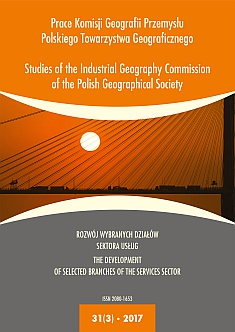The Role of Experience Economy in the Postmodern Interpretation of Market Trends in Tourism and in the Creation of Contemporary Tourism Products
DOI:
https://doi.org/10.24917/20801653.313.1Keywords:
experience economy, heritage interpretation, LARP, postmodernism, tourism productAbstract
The paper deals with the concept of experience economy as one of the most important attempts at presenting the postmodern view of current economy. This concept is obviously a very promising theory to be implemented on tourism market. Tourism product is often defined as a tourist’s experience connected with spending time in a particular place, which underlines the key role of consumers’ experiences in that particular market. This link between experience economy and tourism market is presented in the literature mainly by pointing out common theoretical elements, and papers presenting examples of achievements of experience economy on tourism market are relatively rare. The paper presents concepts of heritage interpretation and LARP logic as examples of effective actions increasing the quality of experiences of tourists consuming products being present on the market often for many years. The aim of the paper is discussion of opportunities of usage of stated concepts in creation of tourism products in accordance to the rules presented in experience economy.
Downloads
Metrics
References
Andersson, T. (2007). The tourist in the experience economy. Scandinavian Journal of Hospitality and Tourism, 7(1), 46–58.
Antonides, G., Van Raaij, W.F. (2003). Zachowanie konsumenta. Podręcznik akademicki. Warszawa: Wydawnictwo Naukowe PWN.
Frochot, I., Batat, W. (2013). Marketing and designing the tourist experience. Oxford: Goodfellows.
Holbrook, M.B., Hirschman, E.C. (1982a). Hedonic consumption: emerging concepts, methods and proposition. Journal of Marketing, 43(3), 92–101.
Holbrook, M.B., Hirschman, E.C. (1982b). The experiential aspects of consumption: consumer fantasies, feelings and fun. Journal of Consumer Research, 9.
Idziak, P. (2009). Konkurencyjność muzeów w gospodarce doznań i kreatywności. W: A. Stasiak (red.). Kultura i turystyka – wspólnie zyskać! Łódź: Wyższa Szkoła Turystyki i Hotelarstwa.
Kaczmarek, J., Stasiak, A., Włodarczyk, B. (2005). Produkt turystyczny. Pomysł, organizacja, zarządzanie. Warszawa: Polskie Wydawnictwo Ekonomiczne.
Kostera, M. (1996). Postmodernizm w zarządzaniu. Warszawa: Polskie Wydawnictwo Ekonomiczne.
Kozak, M. (2009). Turystyka i polityka turystyczna a rozwój: między starym a nowym paradygmatem. Warszawa: Wydawnictwo Naukowe Scholar.
Krippendorf, J. (1982). Towards new tourism policies: The importance of environmental and sociocultural factors. Tourism Management, 3(3), 135–148.
Kruczek, Z., Kurek, A., Nowacki, M. (2010). Krajoznastwo. Kraków: Proksenia.
Kubicki, R. (1993). Postmodernistyczny etos świata? Kultura Współczesna, 2.
Lusch, R.F., Vargo, S.L. (2006). The service dominant logic of marketing: Dialog, debate, and directions. New York: M.E. Shape.
MacCannell, D. (2002). Turysta. Nowa teoria klasy próżniaczej. Warszawa: Muza.
Marciszewska, B. (2010). Produkt turystyczny a ekonomia doświadczeń. Warszawa: CH Beck.
Mazurek-Łopacińska, K. (2003). Zachowania nabywców i ich konsekwencje marketingowe. Warszawa: Polskie Wydawnictwo Ekonomiczne.
Middleton, V.T.C. (1996). Marketing w turystyce. Warszawa: PAPT.
Mikos von Rohrscheidt, A. (2011). Sylabus miejsc, czyli jak atrakcyjnie pokazać miasto współczesnemu turyście kulturowemu. In Z. Kruczek (Ed.), Piloci i przewodnicy na styku kultur (pp. 97-120). Kraków: Proksenia.
Nowacki, M. (2011). Szlaki dziedzictwa naturalnego i kulturowego drogą ku turystyce kreatywnej. W: B. Włodarczyk, B. Krakowiak, J. Latosińska (red.), Kultura i turystyka. Wspólna droga. Łódź: Regionalna Organizacja Turystyczna Województwa Łódzkiego.
Pine, B.J., Gilmore, J.H. (1999). The experience economy: Work is the theatre and every business is a stage. Boston: Harvard Business School.
Prahalad, C.K., Ramaswamy, V. (2000). Co-opting consumer competence. Harvard Business Review, 78(1), 79–90.
Prahalad, C.K., Ramaswamy, V. (2004). Co-creation experiences: The next practice in value creation. Journal of Interactive Marketing, 18(3), 5–14.
Prahalad, C.K., Ramaswamy, V. (2005). Przyszłość konkurencji. Warszawa: Polskie Wydawnictwo Ekonomiczne.
Rogoziński, K. (2006). Klient jako współtwórca wartości. Marketing i Rynek, 8, 2–7.
Smoleńska, O. (2009). Najnowsze trendy w turystyce eventowej. Gry fabularne i wydarzenia związane z fantastyką i technologią XXI wieku. Turystyka Kulturowa, 8, 31–39.
Stasiak, A. (2005). Obszar jako produkt turystyczny. W: K. Pieńkos (red.). Konkurencyjność polskiego produktu turystycznego. Warszawa: Wydawnictwo Wyższej Szkoły Ekonomicznej w Warszawie, 91–102.
Stasiak, A. (2013). Produkt turystyczny w gospodarce doświadczeń. Turyzm, 23(1), 27–35.
Wacławek, D. (2014a) (2016, 19 grudnia). Hogwart jest w Polsce. Nowe zastosowanie starego zamku. Pozyskano z http://foch.pl/foch/1,132039,17093824,Hogwart_jest_w_Polsce__ Nowe_zastosowanie_starego_zamku.html#BoxSlotIMT
Wacławek, D. (2014b) (2016, 19 grudnia). Założyli szkołę czarodziejów, a teraz chcą kupić w Polsce zamek. Larpowcy – szaleńcy czy wizjonerzy? Pozyskano z http://weekend.gazeta.pl/weekend/1,138589,17521955,Zalozyli_szkole_czarodziejow__a_teraz_chca_kupic_w.html# TRwknd
Downloads
Published
How to Cite
Issue
Section
License
Articles are published under the terms of the Creative Commons License (CC BY-ND 4.0; Attribution– NoDerivs).

